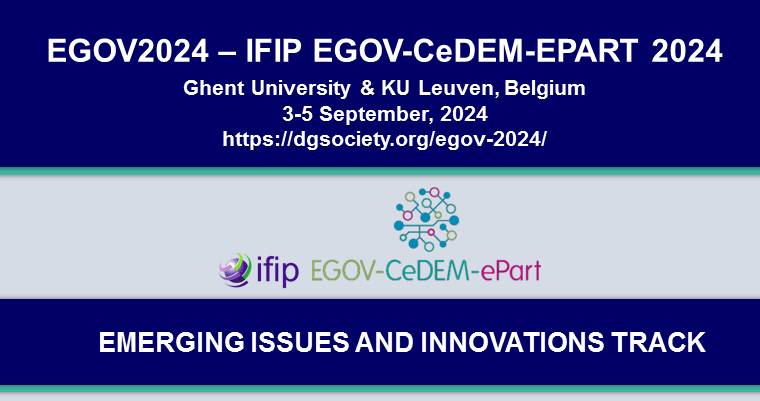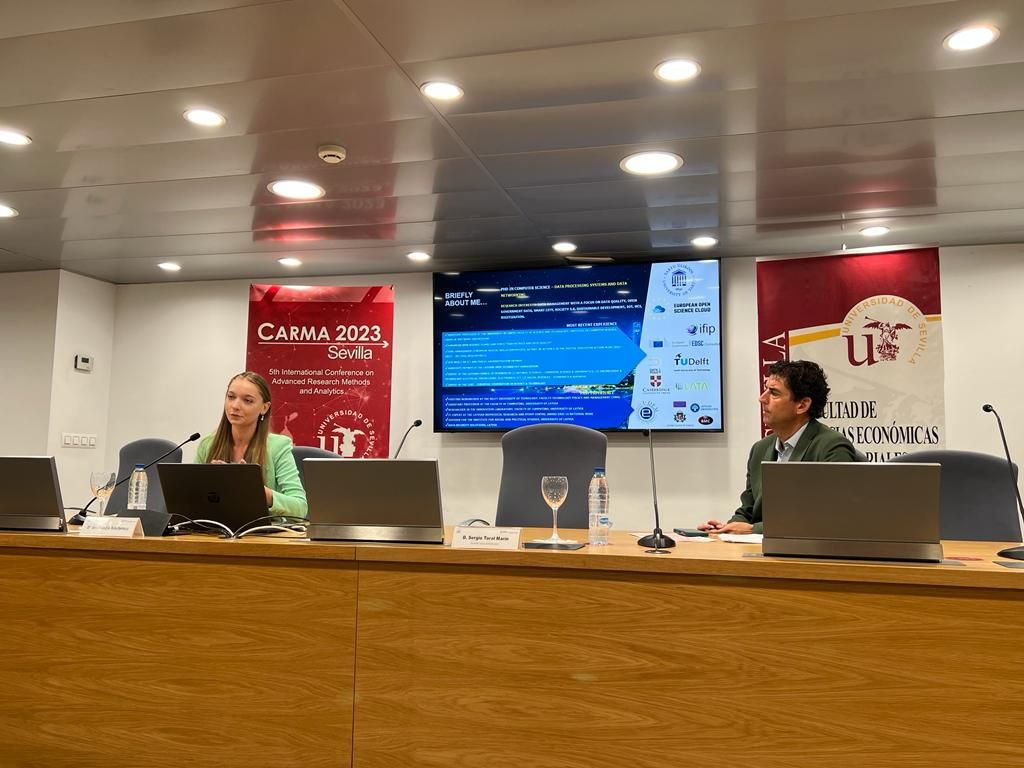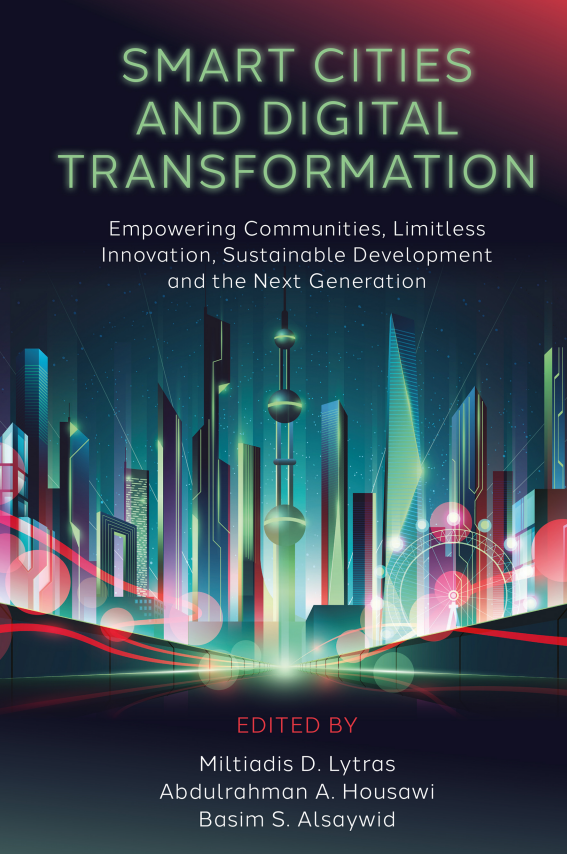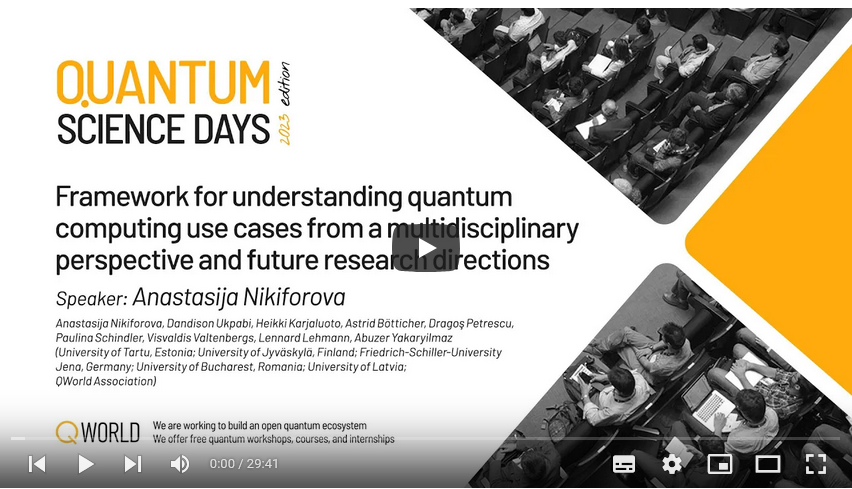Some recent news / activities:

This November I was glad to deliver a keynote at The 3rd International Workshop on Democracy and AI (DemocrAI2023) held in conjunction with the 20th Pacific Rim International Conference on Artificial Intelligence (PRICAI2023), which I entitled “Unlocking the symbiotic relationship of Artificial Intelligence, Data Intelligence, and Collaborative Intelligence for Innovative Decision-Making and Problem Solving” (read more…)

EGOV2023 – IFIP EGOV-CeDEM-EPART – one of the most recognized conference in e-Government, ICT and public administration and related topics invites submissions, including to the Emerging Issues and Innovations Track (chairs: Anastasija Nikiforova, Marijn Janssen, Francesco Mureddu) (read more…)

October is Cybersecurity Awareness Month, as part of which CyberCommando’s meetup 2023 took place in the very heart of Latvia – Riga. Three parallel sessions and numerous talks delivered by 20+ local and international experts, including but not limited to IT-Harvest, Radware, DeepInstinct, Pentera, ForeScout Technologies, CERT.LV, ESET. It is a great honor to complement this list by the University of Tartu, which I represented delivering my talk that I devoted to IoTSE and entitled “What do Internet of Things Search Engines know about you? or IoTSE as a vulnerable open data sources detection tool“ (read more…)

“Framework for understanding quantum computing use cases from a multidisciplinary perspective and future research directions” paper has been published in Futures (Elsevier, Q1), in which we propose a preliminary version of a framework for understanding the social, economic & political use cases of quantum computing identifying possible areas of market disruption & offer empirically based recommendations that are critical for forecasting, planning, and strategically positioning QC for accelerated diffusion (read more…)

June 28 I had the honor to participate in the opening of CARMA2023 – 5th International Conference on Advanced Research Methods and Analytics delivering my keynote “Public data ecosystems in and for smart cities: how to make open / Big / smart / geo data ecosystems value-adding for SDG-compliant Smart Living and Society 5.0?” in the spectacular city of Sevilla, Spain. What the honor to open the conference, immediately after the inaugural speech by organizers and sponsors, including representatives of Joint Research Center, European Commission, who mentioned the topics I cover in my keynote as those that make this conference an event to attend and to learn from!!! (read more…)

25th Annual International Conference on Digital Government Research (dg.o2024) is coming with the revised list of tracks, where the special attention I invite you to draw to is a new track “Sustainable Public and Open Data Ecosystems” (chairs: Anastasija Nikiforova, Anthony Simonofski, Anneke Zuiderwijk & Manuel Pedro Rodríguez Bolívar). (read more…)

The International Conference on Intelligent Metaverse Technologies & Applications (iMeta) and the 8th IEEE International Conference on Fog and Mobile Edge Computing (FMEC) held in Tartu in September, 2023, for where I acted as part of Organizing committee, Technical Program committee, as well as publicity chair (read more…)

EGOV2023 – IFIP EGOV-CeDEM-EPART – one of the most recognized conference in e-Government, ICT and public administration and related topics took place September, 2023 in Budapest (Hungary), where I acted as a presenter of the paper, workshop organizer, chair of two out of three sessions of “Emerging Issues and Innovations” track (co-chaired together with M. Janssen, C. Csaki and F. Mureddu), and a program committee member of Open Data track (read more…)
September 6 – “PPPS’2023 – Proactive and Personalised Public Services: Searching for Meaningful Human Control in Algorithmic Government” workshop as part of International Federation for Information Processing (IFIP) EGOV-CEDEM-EPART2023 organized in cooperation with Digital Government Society, where we will initiate a discussion about personalised and proactive public services, discussing them and learning from the EGOV community about the practice of applying proactive and personalised services in different countries (read more…)

July 11-14 – the week was full of impressions (positive) from the the 24th Annual International Conference on Digital Government Research in the charming Gdańsk (Poland), where we finally had the 3rd edition of our workshop “Identification of high value dataset determinants: is there a silver bullet for efficient sustainability-oriented data-driven development?” as part of dg.o2023, which brought more than 20 participants, with whom we jointly tried to understand conference an event to attend and to learn from!!! (read more…)

The new paper “Overlooked aspects of data governance: workflow framework for enterprise data deduplication” has been just presented at the IEEE-sponsored International Conference on Intelligent Computing, Communication, Networking and Services (ICCNS2023), at which I also acted as part of Steering committee, Technical Program committee, as well as publicity chair (read more…)

June 5 (2023), I was delighted to be invited to be a keynote at the HackCodeX Forum, delivering a keynote titled “Data Quality as a prerequisite for your business success: when should I start taking care of it?” in my hometown – Riga, Latvia. HackCodeX Forum is a one-day event where international experts share their experience and knowledge about emerging technologies and areas such as Artificial Intelligence, Security, Data Quality, Quantum Computing, Sustainability, Open Data, Privacy, Ethics, Digital Services (with a keynote from CEO of SK ID Solutions (read more …)

New book chapter “The Role of Open Data in Transforming the Society to Society 5.0: A Resource or a Tool for SDG-Compliant Smart Living?” (Nikiforova, Alor Flores, Lytras), which is a part of the book “Smart Cities and Digital Transformation: Empowering Communities, Limitless Innovation, Sustainable Development and the Next Generation“, is finally publicly available! (read more …)

One of the recent articles “Towards High-Value Datasets determination for data-driven development: a systematic literature review” (Nikiforova A., Rizun N., Ciesielska M., Alexopoulos C., Miletič A.) just made available on the arXiv was immediately noticed by the Living Library that seeks to provide actionable knowledge on governance innovation, informing and inspiring policymakers, practitioners, technologists, and researchers working at the intersection of governance, innovation, and technology in a timely, digestible and comprehensive manner, identifying the “signal in the noise” by curating research, best practices, points of view, new tools, and developments… Proud to see our joint article there (read more…)

In the very last days of May 2023, I delivered a contributed talk at QWorld Quantum Science Days 2023 (QSD 2023) titled “Framework for understanding quantum computing use cases from a multidisciplinary perspective and future research directions” (Ukpabi, D.C., Karjaluoto, H., Botticher, A., Nikiforova, A., Petrescu, D.I., Schindler, P., Valtenbergs, V., Lehmann, L., & Yakaryılmaz, A) (read more…)

In April (2023) I had an unforgettable experience at the Research and Innovation Forum (RiiForum), serving as plenary speaker of “Advances in ICT & the Society: threading the thin line between progress, development and mental health”, where we – Prof. Dr. Yves Wautelet, Prof. Dr. Marek Krzystanek, Karolina Laurentowska & Prof. Marek Pawlicki – discussed disruptive technologies in our professional lives in the past years, how they affected us and our colleagues, how they affect(ed) society and its specific groups, including their mental health, and general perception of technology, i.e. an enemy of humanity, or rather a friend and support, and how to make sure the second take place (read more…)

This October (2022) I had a pleasure and honor to take part in 14th International Conference on Knowledge Management and Information Systems (KMIS2022), where I was not only attendee, but also an author / presenter, chair session and the person who received Best Paper Awards for the paper “Putting FAIR principles in the context of research information: FAIRness for CRIS and CRIS for FAIRness (read more…)

One of the recent articles “Transparency of open data ecosystems in smart cities: Definition and assessment of the maturity of transparency in 22 smart cities” (Lnenicka, Nikiforova, Luterek, Azeroual, Dandison, Valtenbergs, Machova) was noticed by the Living Library that seeks to provide actionable knowledge on governance innovation, informing and inspiring policymakers, practitioners, technologists, and researchers working at the intersection of governance, innovation, and technology in a timely, digestible and comprehensive manner, identifying the “signal in the noise” by curating research, best practices, points of view, new tools, and developments… Proud to see our joint article there (read more…)

The Open Data Institute hosted micro-site on the exploration of the future of data portals and citizen engagement (led by Rachel Wilson, in collaboration with ODI Associate Consultant Tim Davies) publishes very insightful posts reflecting on the most prospective studies to take stock of the state of portals, and explore possible futures, where two of them reflect on my previous studies! (read more#1…) (read more#2…)

Recently I was honored to contribute to Babu Banarasi Das University (BBDU, Department of Computer Science and Engineering) Development Program «Artificial Intelligence for Sustainable Development» with the talk entitled “Artificial Intelligence for Open Data or Open Data for Artificial Intelligence?”…. (read more…)

July 5 I had a pleasure to serve as a keynote for “Integration of open data and artificial intelligence in the development of smart cities in Africa” workshop and deliver the talk about “Open data and crowdsourced data as enablers and drivers for smart African cities“. The workshop is a part of the African Cities Lab Project aimed at creating a digital education platform on urban development in Africa, and act as a forum for the exchange of digital educational resources and the management and governance of African cities to foster sustainable urban development (read more…)

This June I was glad and honored to take part in a four-day ONE Conference 2022 (co-organised by EFSA, ECDC, ECHA, EEA, EMA, and the European Commission’s Joint Research Centre (JRC)) as one of panelists of the “Turning open science into practice: causality as a showcase” thematic session as part of “ONE society” thematic track, where I served as an open data expert with a substantial background in data quality area (read more …)

September 12 (2022) I had a pleasure to serve as a keynote for the Innovation and Smart Government Conference 2022 (ISGOV2022) opening it with my talk titled “Data as an asset for sustainable development of data-driven smart cities and smart society”…. (read more…)

This year I was invited to organize my own panel session within the Research and Innovation Forum (Rii Forum). I was glad to accept this invitation, but I did not even think about how many roles I will act in it – panel organizer, speaker, PC member, moderator and Best panel moderator award (read more…)

As the general co-chair of the First International Conference in Electronic Governance with Emerging Technologies (EGETC-2022), I sincerely invite you to consider your participation in this event. Its aim is to provide a forum for academics, scholars, and practitioners from academia and industry to share and exchange the recent developments in the domain of e-government and governance of digital organizations… (read more…)

Happy to share that I have been invited to serve as a keynote for the International Innovation and Smart Government Conference “Challenges for Public Innovation in a post-pandemic government” (ISGOV) to be held in September, 2022. ISGOV focuses on understanding the organizational challenges public administrations face at all levels due to the COVID-19 pandemic and how to face the short and medium-term challenges (read more…)
Digitization plays an important role in my activities (academic, research, and professional outside academia). This is also the case for delivered courses and supervised students theses, in addition to my participation in Google.org supported Riga TechGirls initiative – the first community in Latvia aimed at educating and inspiring women and girls in IT, empowering them to be architects of the future, where I acted both as a speaker and as a leading mentor in the digital development workshop on Information and data literacy for more than 2 000 Latvian teachers, as well as my continuous support of Open Data Hackathon for pupils, where I act as a mentor for participants dealing with diverse range of social issues they try to tackle.
This is also a part of my professional activity. This applies not only to the studies I was or am involved in, but also refers to my role of an IT-expert at the Latvian Biomedical Research and Study Centre, BBMRI-ERIC Latvian National Node. As part of my one-year contract with the Latvian Biomedical Research and Study Centre, BBMRI-ERIC Latvian National Node, I was involved in ERDF-funded project “DECIDE – Development of a dynamic informed consent system for biobank and citizen science data management, quality control and integration” and H2020 project “Integration of knowledge and biobank resources in comprehensive translational approach for personalized prevention and treatment of metabolic disorders“. DECIDE was devoted to the development of a dynamic informed consent system for biobank and citizen science data management, quality control and integration (software engineering-oriented), another one – INTEGROMED – was of more biomedical nature, where my major input was related to data management- and data ecosystem- related activities, in scope of which I inspected the current data ecosystem of both Latvian Biomedical Research and Study Centre and related data artifacts, including Latvian Genome database, identified existing gaps, defined room for improvements and tasks together with their allocation from the resource management perspective and took active part in their implementation. It also included digitization to be made at various levels. This included the substitution of the surveys and questionnaires, which were typically completed by hand by either patients, donors or done doctorates and then inserted in the database by manual rewriting of answers from paper-based surveys, by the e-survey system based on the LimeSurvey. Previously, data tended to be incomplete, non-compliant with the database design, inaccurate errors are made, when the person reenter the data to the database from the paper-based survey or interpret the answer to made it compliant with it. The set of e-surveys has been developed and introduced, which allows to ensure data integrity and in-built data quality checks, and compliance with the actual database and reduce the number of errors made within the process of data collection and insertion. The above-mentioned inspection and the definition of corrective actions should allowed a transition of currently rather closed and immature ecosystem to the new and cooperation-oriented open data ecosystem facilitating cooperation with both local and external/ foreign bodies. These activities resulted in a set of guidelines towards efficient data management for heterogeneous data holders and exchangers developed as a deliverable of the HORIZON2020 INTEGROMED project and presented during the European Biobank Week 2021. They aimed at improving awareness among all stakeholders within LBMC and outside it about the data ecosystem. This set of guidelines should create a baseline for other (bio)medical organizations and be consistent with the cooperation-oriented biobank paradigm. It, however, served as an input for the DECIDE – Development of a dynamic informed consent system for biobank and citizen science data management, quality control and integration. Later refers to the software engineering tasks, where requirements for the DECIDE system have been defined (both, software-specific and user experience related ones).
In addition, I am also a part of Quantum Humanities Network hosted by the university of Friedrich-Schiller-Universität Jena, Germany.
Considering my interest and, hopefully, expertise in data management and disruptive technologies, I also act in several events delivering talks based on the ongoing studies on the intersection of data management, and data quality in particular, and AI.
The later, i.e. Artificial Intelligence, is also considered in the context of open data, where an increased popularity of both phenomenons not only reveal new opportunities, but also brings some risks to be addressed by researchers (i.e. the coin has two sides), and as I tend to say, Open data in combination with AI is not only about unicorns and ice-cream.
And of course, from time to time, I refer to another topic, which was the very first topic of my interest in IT – security. The latest studies devoted to this topic by me were mainly devoted to the exploration of vulnerable databases across the Internet, which were inspected by means of IoTSE (Internet of Things Search Engines).
It also lead to the development of several studies. In order to avoid duplicates, here are listed most “purely” digitization-related studies, including some security-related studies, while the full list of articles with some others digitization-related studies can be found here:
I have also delivered some talks on this and related topics or participated in events relevant to them, including:
- Keynote for the 5th International Conference on Advanced Research Methods and Analytics (CARMA2023) “Internet and Big Data in Economics and Social Sciences” – “Public data ecosystems in and for smart cities: how to make open / Big / smart / geo data ecosystems value-adding for SDG-compliant Smart Living and Society 5.0?”, June 28-30, Sevilla, Spain
- 24th Annual International Conference on Digital Government Research (dg.o 2023), Together in the unstable world: Digital government and solidarity, – “Identification of high value dataset determinants: is there a silver bullet for efficient sustainability-oriented data-driven development?” workshop, 11-14 July 2023, Gdańsk, Poland
- ICCNS2023 – International Conference on Intelligent Computing, Communication, Networking and Services – “Overlooked aspects of data governance: workflow framework for enterprise data deduplication“, June 19-22, Valencia, Spain
- 24th International Conference on Computer Systems and Technologies CompSysTech’23 – “Predictive Analytics intelligent decision-making framework and testing it through sentiment analysis on Twitter data“, June 16-17, Ruse, Bulgaria
- HackCodeX Forum – keynote with the talk “Data Quality as a prerequisite for you business success: when should I start taking care of it?” June 5, Riga, Latvia
- QWorld Quantum Science Days 2023 (QSD 2023) – “Framework for understanding quantum computing use cases from a multidisciplinary perspective and future research directions”, May 29-31, Online
- Research and Innovation Forum 2023 “Innovation 5.0: Navigating shocks and crises in uncertain times Technology-Business-Society”(RiiForum2023): “Advances in ICT & the Society: threading the thin line between progress, development and mental health“, April 11-14, 2023, Krakow, Poland – plenary debates
- 14th International Conference on Knowledge Management and Information Systems (KMIS2022) – Putting FAIR principles in the context of research information: FAIRness for CRIS and CRIS for FAIRness (authors: Azeroual, Schopfel, Polonen, Nikiforova), October 24-26, Malta – best paper award
- Keynote for the International Innovation and Smart Government Conference (ISGOV2022) with the talk titled “Data as an asset for Sustainable Development of data-driven Smart Cities and Smart Society” – September 12-14 (web-based)
- Invited talk for Babu Banarasi Das University (BBDU, Department of Computer Science and Engineering) Development Program «Artificial Intelligence for Sustainable Development» with the talk entitled “Artificial Intelligence for Open Data or Open Data for Artificial Intelligence?” – September 24 (web-based)
- Keynote for “Integration of open data and artificial intelligence in the development of smart cities in Africa” workshop organized as part of the African Cities Lab Project, keynote speaker with the talk on “Open data and crowdsourced data as enablers and drivers for smart African cities” – July 5 (web-based)
- International Conference on Intelligent Data Science Technologies and Applications (IDSTA20presenting the paper co-authored with my student – Digital health shopping assistant with React Native: a simple technological solution to a complex health problem (Govoruhina & Nikiforova), September 5-7, 2022, San Antonio, Texas, USA
- ONE Conference 2022 (Health, Environment, Society) – panelist of the “ONE society” thematic track, panel discussion “Turning open science into practice: causality as a showcase”, June 21-24, Brussels, Belgium
- The 12th Samos 2022 Summit on ICT-Enabled Governance in conjunction with the 9th International Summer School On Open and Collaborative Governance, July 4-8 2022, Samos, Greece
- DeepLearn 2022 Summer School (organized by Institute for Research Development, Training and Advice – IRDTA, Brussels/London, Universidad de Las Palmas de Gran Canaria, Universitat Rovira i Virgili)
- European Food Safety Authority (EFSA) and Evidence-Based Toxicology Collaboration (EBTC) joint workshop for setting the scene on the creation of a standard for data exchange in support of automation of Systematic Review – speaker / expert – July 7 (web-based)
- the 4th international conference on AIRSI2022 Technologies 4.0 in Tourism, Services & Marketing (AIRSI – Artificial Intelligence, Immersive Technologies, Social Networks and Internet of Things), extended abstract “Integrating AI into Customer Service: Improving the Actionability of Customer Feedback Analysis Using Machine Learning” (Salminen J., Mustak M., Rizun N., Revina A., Nikiforova A., Almerekhi H., Jung S., Jansen B.J.), July 11-13, web-based
- Invited Talk (2022) “Data Security as a top priority or what Internet of Things (IoT) Search engines know about you“, monthly “Virtual Brown Bag Lunch Talks” intended for the Information Technologies, Manufacturing, and Engineering Employees in Companies associated with Index Manufacturing Association (Mexico, web-based), June 16
- Guest Lecture (2022) “The role of open data in the development of sustainable smart cities and smart society“, the Federal University of Technology – Parana (UTFPR, Brazil), May 5
- 15th International Conference on Current Research Information Systems (CRIS2022) – Linking Research Information across data spaces: “Combining Data Lake and Data Wrangling for Ensuring Data Quality in CRIS“, May 11-14, Croatia (authors: Azeroual, Schopfel, Ivanovic, Nikiforova)
- Research and Innovation Forum 2022 (RiiForum2022): “Data security as a top priority in the digital world: preserve data value by being proactive and thinking security first“, April 20-22, 2022, Athens, Greece (hybrid mode)
- The Fifteenth International Conference on Research Challenges in Information Science (RCIS2021): “Digitalization in Sports to Connect Child’s Sport Clubs, Parents and Kids: Simple Solution for Tackling Social and Psychological Issues“, Cyprus (web-based) (authors: Marcenko I., Nikiforova A.)
- The 4th International Workshop on Data Science Engineering and its Applications (DSEA 2020) in conjunction with The Seventh International Conference on Social Networks Analysis, Management and Security (SNAMS-2020): “Towards a Concurrence Analysis in Business Processes” (web-based)
- Europe Biobank Week 2021, Section “Novel IT solutions, effective data storage, processing and analysis” – “Towards efficient data management of biobank, health register and research data: the use-case of BBMRI-ERIC Latvian National Node” (authors: Nikiforova A., Rovīte V., Ansone L.)
- Europe Biobank Week 2021, Section “Population-based cohorts – addressing global challenges for future generations” – “Development of a dynamic informed consent system for Latvian national biobank and citizen science data management, quality control and integration” (authors: Kante N., Nikiforova A., Kalēja J., Svandere A., Mezinska S., Rovīte V.)
Past activities

This February I took part in Google.org supported programme launched by Riga TechGirls – the first community in Latvia aimed at educating and inspiring women and girls in IT, empowering them to be architects of the future – as both a speaker and lead mentor for the digital development workshop on Information and data literacy for more than 2000 Latvian teachers (read more…)

This November (8-10 November, 2021) I had an opportunity to take part in the Europe Biobank Week 2021 with this year’s theme “Biobanking for our Future – Opportunities Unlocked”, where I was honored to be represented in two posters as part of the Latvian Biomedical Research & Study centre team, where I work as an IT-expert. (read more…)

Recently I have delivered an Invited Talk at the International Conference and Expo on Nanotechnology and Nanomaterials 2021: “Open Data as a driver of Society 5.0: how you and your scientific outputs can contribute to the development of the Super Smart Society and transformation into Smart Living?“ (read more…)

This October (2021) we have successfully prepared and submitted the next INTEGROMED deliverable “Guidelines for the maintenance of efficient biobank, health register and research associated data management”. It aimed at improving awareness among all stakeholders within LBMC and outside it about the data ecosystem. We have inspected the current situation, identified weak aspects, defined the room for improvement and planned activities to be carried out. This set of guidelines should create a baseline for other (bio)medical organizations and be consistent with the cooperation-oriented biobank paradigm (read more…)
